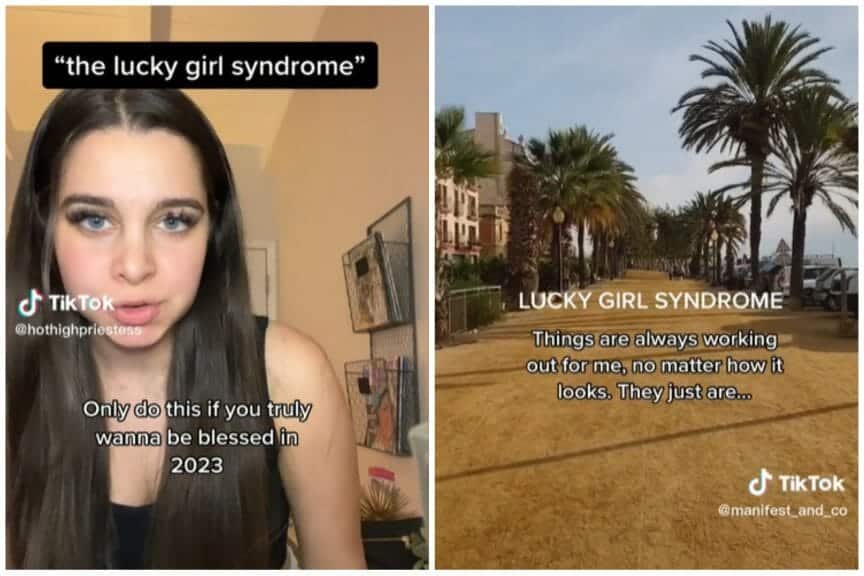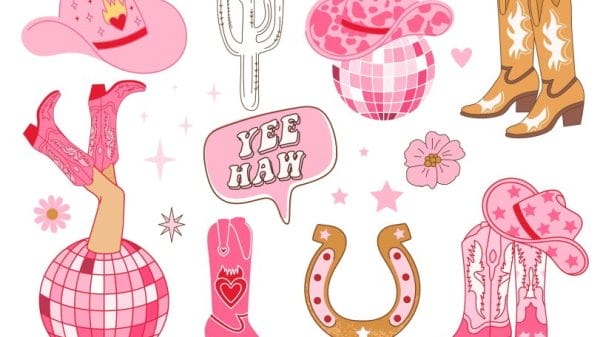If you’ve been on TikTok recently, you might have seen the videos all about ‘Lucky Girl Syndrome’. Certain lucky girl TikTokers are raving about how they get amazing opportunities just from “expecting great things” to happen. Much like manifestation and subliminals, lucky girl syndrome is yet another pseudoscience trend to go viral. But does the lucky girl technique work for everyone?
It’s no secret that ‘lucky girl’ is the latest TikTok buzzword. TikTok videos tagged with #LuckyGirlSyndrome have been watched a collective 149.6 million times. Essentially, lucky girl syndrome is the belief that affirmative mantras and a positive mindset will make things go your way. Followers of the trend are encouraged to repeat phrases like “I am so lucky; everything works out for me” and wholeheartedly believe that things will be great for them without them having to do anything.
The lucky girl trend really began making the rounds on TikTok after user Laura Galebe (@lauragalebe) posted a video describing herself as “one of the luckiest people [she] knows”. According to her, solely believing that great things will happen to her made her life drastically change. Whilst she acknowledges that it is slightly ‘delusional’, she says that being overly confident about luck is key to being successful. After seeing Laura’s success, many others put her method to the test and got some amazing results. Those who have been successful have boasted about buying their first house, winning sports bets, or getting a promotion at work.
How does lucky girl syndrome work?
Lucky girl syndrome is based on the law of assumption. This idea was first written about by Neville Goddard, a New Thought mystic. The law of assumption is a theory that what we believe to be true will become reality. If you believe you already have something, you will eventually manifest it. This theory hinges on the idea that our assumptions and thoughts have immense power to impact what we get in life.
However, manifestation and the law of assumption have been debunked by many professionals. Unfortunately, thinking about something and saying mantras won’t bring whatever you desire into existence unless you take action. Even then, taking action doesn’t always lead to the outcome you had hoped for. Whilst thinking positive thoughts and using mantras can make you feel better and impact your actions, they cannot make wishes come true. On top of this, those who do benefit from lucky girl syndrome all have something in common: privilege.
Why Lucky Girl Syndrome is really about reaping the benefits of privilege
Ultimately, lucky Girl Syndrome is just a new form of toxic positivity. Telling people who have mental or physical disabilities that they can change their life by thinking positive thoughts is ableism. Of course, thinking positively is helpful but when it starts to be hailed as a way to change your circumstances without action, it becomes toxic. So-called lucky girl syndrome is really about privilege. Whether as a result of skin colour, race, income, lack of physical or mental health conditions, or ’attractiveness’, privilege makes life a lot easier. There’s no denying that good things will come easier for someone if they’re not from a marginalised group. When it comes down to the ‘problems’ that are ‘solved’ by this technique, they’re usually first-world problems like wanting a promotion at work.
Although the idea of getting whatever you wish for through positive thinking is cool, that’s not how our universe works. Flaunting how good your life is because of your inherent privileges and writing it off as luck is both tasteless and toxic. Like most manifestation trends that circulate online, lucky girl syndrome has no grounds in reality and promotes harmful ideas.













